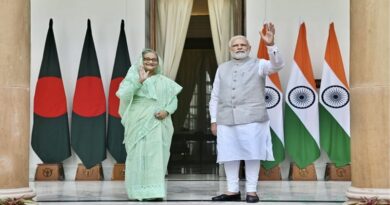Operation Sindoor: Global Reactions to India’s Military Strikes on Pakistan

On May 7, 2025, India launched “Operation Sindoor,” a series of missile strikes targeting nine locations in Pakistan and Pakistan-occupied Kashmir (PoK). This operation was a response to the terrorist attack in Pahalgam, Indian-administered Kashmir, on April 22, which resulted in the deaths of 26 Hindu tourists. The Indian government described the strikes as “focused, measured, and non-escalatory,” targeting terrorist infrastructure of groups like Jaish-e-Mohammed and Lashkar-e-Taiba. Pakistan, however, claimed that 31 civilians were killed and 46 injured in the attacks, and vowed retaliation.
United States: Calls for Restraint
U.S. President Donald Trump referred to the escalating tensions between India and Pakistan as a “shameful” situation and expressed hope for a swift restoration of peace. Secretary of State Marco Rubio stated that the U.S. is closely monitoring the situation and engaging with both nations to encourage dialogue. The U.S. emphasized the importance of maintaining regional stability and avoiding further escalation.
Israel: Strong Support for India
Israel expressed unequivocal support for India’s right to self-defense. The Israeli Ambassador to India, Reuven Azar, stated that Israel stands by India in its fight against terrorism and that terrorists must pay the price for their actions. This statement underscores Israel’s commitment to counterterrorism efforts and its solidarity with India.
China: Appeal for Peace
China called for both India and Pakistan to maintain peace and avoid actions that could complicate the situation further. The Chinese Foreign Ministry urged restraint and emphasized the need for dialogue to resolve differences peacefully. China’s response reflects its desire to maintain stability in the region while balancing its relations with both neighboring countries.
United Nations: Concern Over Escalation
United Nations Secretary-General António Guterres expressed concern over the military activities along the Line of Control and the international border between India and Pakistan. He urged both nations to exercise restraint and avoid actions that could lead to further escalation. The UN’s call highlights the global concern over the potential for conflict between two nuclear-armed neighbors.
United Arab Emirates: Emphasis on Diplomacy
The United Arab Emirates (UAE) emphasized the importance of resolving tensions through diplomacy and dialogue. UAE’s Minister of State for Foreign Affairs, Sheikh Abdullah bin Zayed Al Nahyan, stated that the best way to address the situation is through peaceful negotiations and mutual understanding. The UAE’s position underscores its commitment to regional peace and stability.
Russia: Support for India’s Security Concerns
Russia expressed concern over the rising tensions between India and Pakistan and called for both countries to exercise restraint. Russian Foreign Ministry spokesperson Maria Zakharova stated that Russia understands India’s security concerns and supports its right to defend itself against terrorism. However, Russia also cautioned against actions that could lead to further destabilization in the region.
Pakistan: Vow for Retaliation
Pakistan condemned India’s military strikes as “cowardly” acts of war and vowed to respond. Prime Minister Shehbaz Sharif stated that Pakistan would retaliate at a time and place of its choosing. The Pakistani military claimed to have shot down five Indian jets and engaged in artillery exchanges along the Line of Control, resulting in additional casualties on both sides.
Conclusion
The global reactions to India’s Operation Sindoor reflect a complex web of geopolitical interests and concerns. While some nations, like the United States and Israel, have expressed support for India’s actions, others, such as China and the United Nations, have called for restraint and dialogue. Pakistan’s vow for retaliation indicates the potential for further escalation, making it imperative for all parties to prioritize diplomatic efforts to de-escalate the situation and prevent a full-scale conflict. The international community’s role in facilitating dialogue and promoting peace remains crucial in ensuring regional stability and preventing the proliferation of violence.





